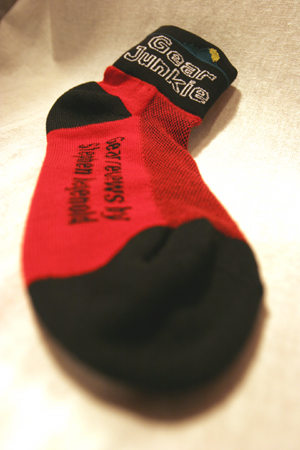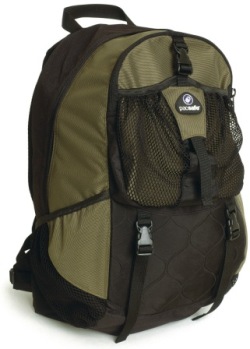Defeet's custom athletics socks
The result was an innovative mesh-weave sock design that used advanced knitting machines and the then-new CoolMax yarn. Within a short time, the Hildebran, N.C., company was making custom socks for cyclists including Lance Armstrong and Greg LeMond.
Over the past decade, Defeet has grown into one of the largest specialty sock companies in the world, and despite a full line of socks for sports ranging from downhill skiing to adventure racing, custom design is still an important part of Defeet's business. Running clubs, events organizers, professional athletics teams, corporations and high school sports programs can purchase Defeet socks complete with custom colors, knitted logos on the cuff and text on the sole.

Stephen Rengold gets a toe up on other reviewers with Defeet Custom Socks...
To start the design process, customers go to Defeet's Web site and choose a base sock model. Your team or company logo can be e-mailed as a JPG graphic file to Defeet. From there, Defeet has a color picker software program on its Web site - www.defeet.com/customshop.php - where you can test and preview hundreds of available sock color schemes.
There is a $25 art fee to get started, for which the company will tweak and optimize your logo or graphic for knitting onto the sock cuff. After colors have been chosen and you've decided what text to put on the sole, Defeet knits a sample sock and ships it out to you for approval before starting the big knit run.
As the custom design service is geared toward event organizers and athletics teams, Defeet enforces a minimum order of six dozen pair for custom alpine ski socks and a minimum of 12 dozen pair for other models. Depending on the model, prices start at around $4.50 per pair at the minimum order level and decrease in price the higher the quantity purchased.
(The company is working on technology to make smaller batch custom orders more economical. In the future, Defeet hopes to make its custom services attractive to small athletics teams or even individuals who would like custom graphics but cannot justify purchasing dozens of pairs of socks.)
For the Gear Junkie custom sock, I chose Defeet's Cush model as the base. This sock is a version of the company's original Air-E-Ator mesh-weave bike sock, but with a thicker sole to accommodate running or hiking. Designing the sock took me less than 20 minutes, and the company had a sample sock shipped to me within a couple weeks.
Defeet knits the socks at its North Carolina factory. The entire process takes four to six weeks from design to construction to delivery.
Contact: Defeet International, (800) 688-3067, www.defeet.com.



 Subscribe to Stephen's RSS Feed
Subscribe to Stephen's RSS Feed
 Subscribe to Stephen's RSS Feed
Subscribe to Stephen's RSS Feed